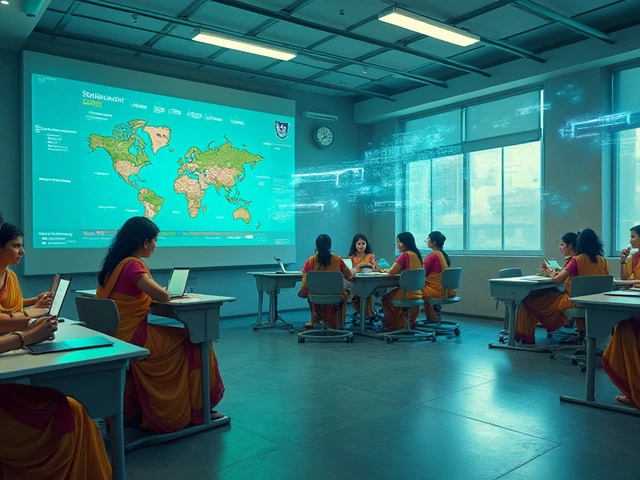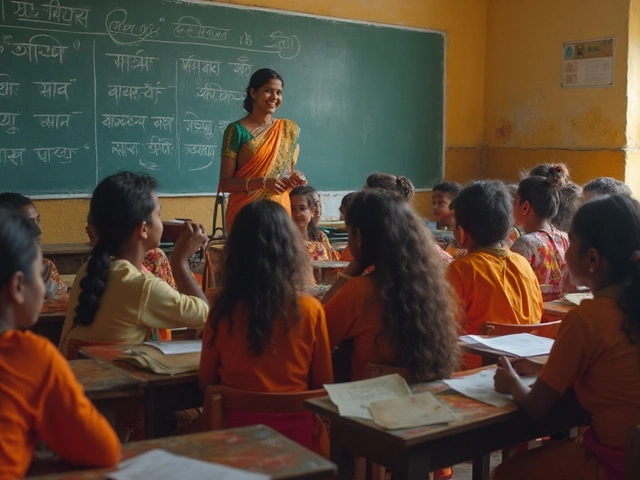People argue about which school board is ‘the easiest’ in India all the time. But here’s the real deal—students are just looking for less stress, more options, and a fair shot at board exams. Tons of students and parents zero in on CBSE, and it’s not hard to see why. The syllabus is simple, there’s less mugging up, and CBSE schools are everywhere—even if you move cities.
If you already feel lost between CBSE, ICSE, and a dozen state boards, you’re not alone. Each one has its own style, tricks, and pain points. But CBSE stands out. It’s tuned into national-level exams like NEET, JEE, and all those big entrance tests you hear about. No board is magic, but some do make your life a bit easier—at least on paper.
So, why do people keep calling CBSE the easiest? What exactly makes it that way? Stick around for answers, straight talk, and tips on how to navigate the board without losing your cool.
- Why Students Ask About the 'Easiest' Board
- CBSE vs. Other Boards: How They Stack Up
- What Makes CBSE Syllabus Student-Friendly?
- Smart Tips for Studying CBSE
- Is CBSE Actually the Best Option For You?
Why Students Ask About the 'Easiest' Board
Everyone wants a path that’s a little less bumpy, right? With school boards in India, students are always swapping tips about which one feels lighter or easier to handle. The real game is about less stress, better scores, and more time for things that matter—like entrance coaching or hobbies.
A big chunk of students—and their parents—rank boards by how tough the syllabus and exams seem. If your board piles on endless theory or asks tricky questions, that translates to more late-night cramming. On top of that, a lot of parents move cities for work, so switching boards frequently is a real hassle. A board with a simple pattern and presence all over India can feel like a lifeline.
- CBSE has over 27,000 schools under its belt, far more than ICSE or many state boards.
- The board’s English is straightforward; the language isn’t full of twists or old-school phrases.
- Science and Math concepts mostly stick to the basics, with fewer exceptions or advanced curveballs compared to some state boards or ICSE.
Check out some quick stats that matter when picking the 'easiest' board:
| Board | Syllabus Complexity | Exam Pattern | No. of Schools | Pan-India Presence |
|---|---|---|---|---|
| CBSE | Moderate, uniform | Objective & Subjective mix | 27,000+ | Strong |
| ICSE | High, theory-heavy | More descriptive | 2,300+ | Medium |
| State Boards | Varies (low to high) | Mostly descriptive | Depends on state | Local |
In most cases, students ask about the 'easiest' board because they don’t want their school life to crush them. They pick familiarity, flexibility, and a syllabus that’s in sync with national entrance exams. If you’ve heard your friends or family say CBSE is designed for bigger exams like NEET and JEE, they’re not wrong. That’s a huge reason behind its popularity and reputation for being manageable.
CBSE vs. Other Boards: How They Stack Up
This is where the debate really heats up. Everyone’s got an opinion, but let’s break it down with basics: CBSE, ICSE, and most state boards all mean different things for how you learn, what you memorize, and the kind of exams you’ll see. Each board shapes your school life and future choices in its own way.
CBSE is everywhere. With over 27,000 schools across India, it’s pretty much the go-to. The textbooks stay the same, whether you’re in Delhi or Kochi. It’s popular because the syllabus is shorter, more focused on concepts than memorizing stuff, and lines up really well with exams like JEE and NEET. The grading system is kind to students, and most assignments actually help you revise instead of just filling notebooks.
Now, ICSE is detailed—like, super detailed. The English is tough, and there’s way more to study, especially for history, biology, and language papers. Some folks love the depth and the solid language foundation, but yes, the workload is higher.
State boards are a mixed bag. Chennai’s Tamil Nadu board is known for cut-and-dried questions but not much depth. Some state boards have easy papers, but employers and colleges don’t always see their marks as equal to CBSE or ICSE.
- CBSE: Concept-focused, short chapters, main subjects, easy transfers, lots of sample papers
- ICSE: Big on languages and arts, heavy syllabus, exams are lengthy, more project work
- State Boards: Regional content, simpler languages, sometimes more memorization, recognition varies
To help you compare at a glance, check out this table:
| Board | No. of Schools | Main Focus | Exam Style | Best For |
|---|---|---|---|---|
| CBSE | 27,000+ | Concepts, Science | Objective & Short Answers | Competitive Exams, Easy Transfers |
| ICSE | 2,300+ | English, In-depth Subjects | Long Answers, Projects | Language Skills, Strong Theory |
| State Boards | 40,000+ | Regional Content | Theory & Memory-based | Local Colleges, Regional Jobs |
If you want smooth transfers, a syllabus focused on competitive exams, and less struggle with rote learning, CBSE wins the match for a lot of families. But if you want in-depth English or you’re planning to apply abroad, ICSE could be worth the grind.

What Makes CBSE Syllabus Student-Friendly?
When people talk about school life in India, the CBSE syllabus often comes up as easy to handle. It’s not just hype—there are real reasons why students find it friendlier than most other boards.
First, the language in CBSE textbooks is direct and easy to understand. The focus is on concepts instead of stuffing your brain with facts you’ll forget after exams. NCERT books, which form the core of CBSE, skip flowery words and go straight to the point. This saves you from those endless hours of memorizing complicated definitions.
CBSE keeps its content light on local stuff. What’s covered is relevant anywhere in India. This helps students if they have to switch schools or move cities, which happens a lot with families who relocate for jobs.
Another thing many parents love—board questions don’t push you into a panic with crazy out-of-syllabus problems. Most of the board exam papers are based on examples straight from the textbook. If you’ve understood your NCERT, you’re already prepared for a big part of the exam. No need to chase 50 reference books.
There’s also less pressure to be a topper. Continuous and Comprehensive Evaluation (CCE), which CBSE used for a few years, still influences how teachers handle internal assessments. You get marked on practicals, class involvement, and project work—not just cramming and final exams. That means more chances to pick up marks through regular effort, not last-minute hustles.
Let's not forget how the CBSE structure matches competitive exams. Chapters and subjects are designed around what actually shows up in major entrance tests—think NEET and JEE. So, you’re not just studying for boards, but killing two birds with one stone if you plan on taking those national-level exams anyway.
While there’s homework and pressure everywhere, CBSE tries hard not to bury you in it. There’s a balance between academics, sports, and extra stuff like quizzes and cultural events, especially in most city schools. That little break can go a long way for your peace of mind.
Smart Tips for Studying CBSE
Studying under the CBSE board shouldn’t feel like a marathon you didn’t sign up for. Good news: you don’t need superpowers—just some smart habits and real-world hacks share the load. Here’s how to make CBSE work for you without burning out.
First up, focus on the NCERT books. CBSE’s own board exams and national entrance tests literally pull 80-90% of their questions straight from these textbooks. Extra guides can help, but don’t lose valuable time juggling 10 reference books. The questions in board papers practically come word-for-word from NCERTs.
Use the sample papers and question banks released every year. CBSE uploads the latest versions online for each subject—these nail down the question patterns and the kind of language they expect. Solving these papers also helps you beat that last-minute exam panic.
- Study with small, regular chunks of time instead of big cramming sessions. Fifteen minutes every day for tricky subjects works better than five hours once a week.
- Build short, summarized notes after reading each chapter—makes revision before exams a breeze.
- Don’t skip diagrams and maps, especially for biology, geography, or social science. Sometimes diagrams alone grab you 1-2 bonus marks if your answer wording is shaky.
- Ask teachers about any chapter changes. CBSE sometimes tweaks, cuts, or adds parts to the syllabus each year.
- If you can, pair up with a friend and quiz each other on important definitions and formulas.
Wondering if this approach actually pays off? Here’s something interesting: according to CBSE’s 2024 results, students who practiced at least 5 sets of sample question papers scored an average of 14% higher per subject than those who didn’t.
| Study Habit | Average Exam Score Rise |
|---|---|
| Sample Papers + NCERT-focused revision | +14% |
| Daily Small Chunks vs Weekly Cramming | +8% |
| Diagram/Map Practice | +6% |
Sticking to these routines isn’t rocket science, but they’re proven to boost how you absorb and remember things. And don’t forget—when it comes to the CBSE syllabus, you’re not rewarded for fancy answers. Keep it straight, clear, and just like in the textbook. That’s how you score those straightforward marks without extra fuss.

Is CBSE Actually the Best Option For You?
Choosing a board is a pretty big decision. The CBSE board works for millions of students, but it’s not a guaranteed ticket to success for everyone. Here’s what you actually need to know if you’re thinking about picking CBSE.
First, CBSE follows a syllabus that lines up closely with national entrance exams like JEE and NEET. If you’re gunning for engineering, medicine, or government jobs after school, you’ll probably find CBSE’s subjects and pattern a lot more familiar. Most standard entrance question papers are based on CBSE textbooks or their format, so you might get a bit of an edge.
What about the way things are graded? CBSE uses a continuous and comprehensive evaluation (CCE) system up to Class 10. This means less pressure all at once—your grades come from both exams and projects across the year. For kids who freeze up at big final exams, this can be a huge relief. The actual board exams are known for being more straightforward compared to some other boards, focusing on basic concepts rather than complicated language or nitpicking details.
Here’s a quick look at what makes CBSE different from other popular boards:
| Board | Syllabus Style | Known For | Exam Pattern |
|---|---|---|---|
| CBSE | Concept-based, national-level | Entrance exam focus, wide presence | Mostly direct questions, CCE till Class 10 |
| ICSE | Detailed, more subjects | English, Literature depth | More writing, analytical questions |
| State Boards | Local language, may change state to state | Regional relevance | Mixed patterns, often more memorization |
But let’s get real—CBSE isn’t perfect for everyone. If you love English and writing or want more flexibility with creative subjects, ICSE can be a better fit. Kids moving between states sometimes find gaps in state board syllabuses, but not so much with CBSE. On the flip side, state boards sometimes make it easier to score higher marks in 12th, depending on your state.
So, check your goals first. Do you plan to try for national competitive exams? Do you need a board that’s available all over India because your family moves a lot? Or are you super passionate about writing and language subjects? Your answer should point you toward the right choice.
- If you want national-level test practice and lots of school options, CBSE works well.
- If you prefer deep language study and don’t mind tough exams, ICSE is worth a shot.
- If you want board exams mostly in your mother tongue or value local history, check out your state board.
End of the day, “easiest” really depends on the kind of student you are. Don’t just follow the crowd—pick what fits your strengths and future plans best.






Write a comment: